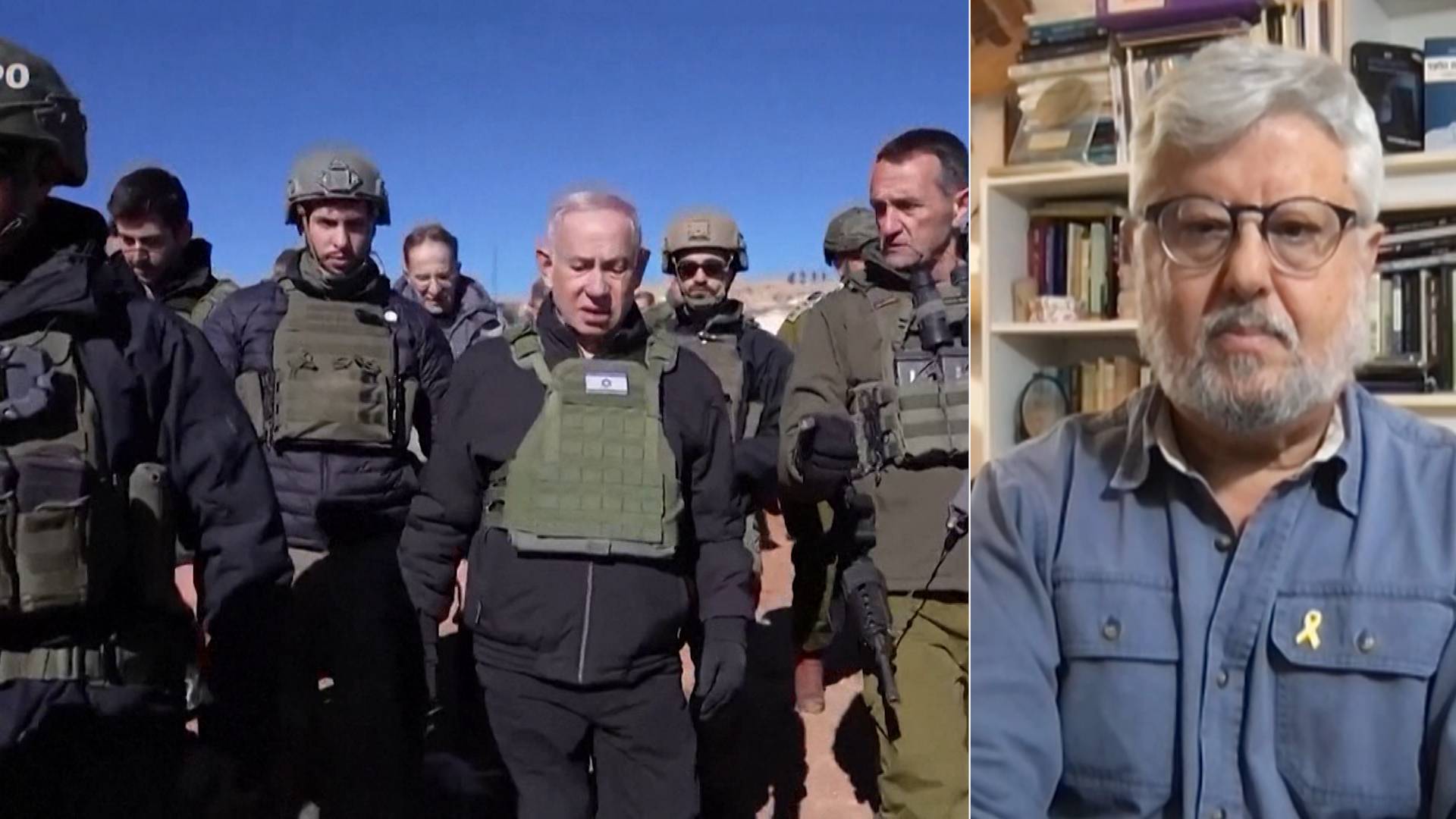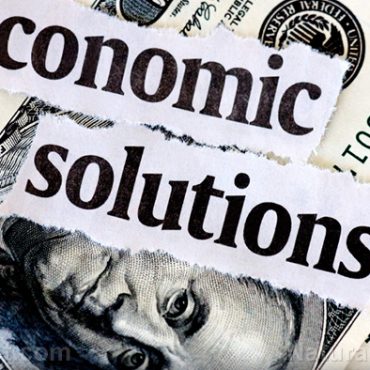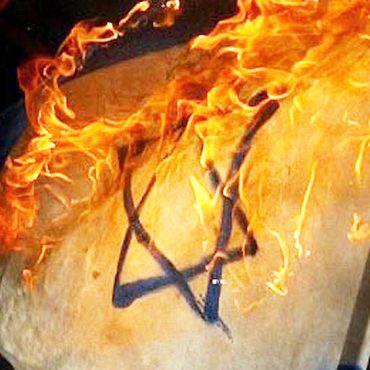This is a rush transcript. Copy may not be in its final form.
NERMEEN SHAIKH: This is Democracy Now!, democracynow.org, The War and Peace Report. I’m Nermeen Shaikh.
We turn now to Gaza, which is entering its second winter under Israel’s relentless war, and talks to reach a ceasefire deal between Israel and Hamas appear to have stalled. This comes as a new report by the Israeli Health Ministry is set to be submitted to the United Nations this week that alleges hostages held in Gaza have faced torture, including sexual and psychological abuse, starvation, burns and medical neglect. Meanwhile, the abuse and psychological torture of Palestinian detainees in Israeli prisons and camps are also a focus of international mediators working to secure a ceasefire that could include the release of thousands detained during and before the Gaza war began, in return for Israeli hostages. A new report by Reuters found that amid the push for a ceasefire, Palestinians released from Israeli jails bear mental and physical scars. This is former detainee and Palestinian bodybuilder Moazaz Obaiyat.
MOAZAZ OBAIYAT: [translated] Life in jail since October 7th is a life that no human on Earth can imagine in general, especially in the prison of Negev, which is like Guantánamo. It is a prison in the Negev Desert, down to the bottom of Palestine on the map. This prison is isolated from the world. The Israeli forces act in the most disgusting and tough torture on Earth against isolated detainees, handcuffed, hungry and ill.
NERMEEN SHAIKH: Well, for more, we’re joined by Gershon Baskin, Middle East director of the International Communities Organization, a human rights advocacy group. For years, he’s been a backchannel negotiator with Hamas in ceasefire deals, including throughout Israel’s current war on Gaza and in 2011, when he helped negotiate the release of Israeli soldier Gilad Shalit from Hamas captivity in exchange for the release of 1,027 Palestinian prisoners. His memoir is titled In Pursuit of Peace in Israel and Palestine.
Gershon Baskin, welcome back to Democracy Now! If you could begin by talking about the status of the talks right now and what you understand is holding up an agreement?
GERSHON BASKIN: Right. The status of the talks is that they have been speaking for months about the deal that was presented by President Biden in the end of May, a deal for a six-week ceasefire during which time about 30 or 32 Israeli hostages would be released in exchange for an agreed number of Palestinian prisoners. The belief is that the ceasefire would continue into a second six-week period, during which time more hostages would be released. But what we know is that the Israelis are demanding Hamas to present a list of hostages that they would release, including young people that Hamas wants to hold onto the second part of the deal or the final part of the deal, and the Israelis are insisting on that release.
From my talks with Israeli negotiators, what I understand is that there’s an expectation that in about three weeks from now, when President Trump enters the White House, there would be a deal, maybe because President Trump would tell Prime Minister Netanyahu that it’s time to make a deal. Until then, it’s quite evident that Netanyahu doesn’t want to make a comprehensive deal that would bring all the hostages home, because that would require Israel to end the war and to withdraw from Gaza, something that Netanyahu has said repeatedly that he’s not ready to do.
NERMEEN SHAIKH: Well, let’s go to, you know, the comments that have been made about Netanyahu being the principal obstacle to an agreement, people who say that he has repeatedly sabotaged ceasefire negotiations and that he’s doing so precisely to save his political career. Earlier this month, as word was circulating that a ceasefire deal was imminent, Netanyahu told The Wall Street Journal, quote, “I’m not going to agree to end the war before we remove Hamas. We’re not going to leave them in power in Gaza, 30 miles from Tel Aviv. It’s not going to happen.” In response to his remarks, Israeli opposition minister Yair Lapid said in a radio interview, quote, “Netanyahu doesn’t want a deal because of his politics. He’s doing the same trick he’s done before; the negotiations are progressing and becoming possible — and then he goes to the foreign media and explains that he won’t stop the war and signals to Hamas that there’s no reason to make an agreement with him.”
Netanyahu has also been criticized by the families of hostages, who say he’s sacrificing their lives for his own political purposes. At a protest last weekend, a family member addressed his pleas directly to incoming U.S. President Donald Trump.
ZAHIRO–SHAHAR MOR: Mr. President, sir, you are the only one who can pressure Netanyahu. Please, do not agree to a partial deal. That is a death sentence to those who stay behind, and it will not bring an end to the war. Don’t allow Netanyahu to continue torpedoing the deal. The statements made by Netanyahu and his newly appointed Defense Minister Katz regarding retained Israeli military control over the Gaza Strip and continuing the war serve only the most extreme factions in Netanyahu’s government.
NERMEEN SHAIKH: So, Gershon Baskin, if you could talk about the kind of pressure that’s being brought to bear on Netanyahu from within Israel itself to come to an agreement so that the hostages can be released and this brutal assault on Gaza ended?
GERSHON BASKIN: Well, you know, one of the chief negotiators told me months ago that Netanyahu here is the sole decision-maker on this issue. And this is quite clear. There’s very little that the families of hostages have been able to do. We’ve been participating in demonstrations every single week. There are demonstrations that take place every single day. But Netanyahu and his political machine have maneuvered the issue of the hostages to be politicized, so that there are people who believe that if you’re calling for a deal and ending the war, you’re in fact a traitor to Israel.
Here, the big problem is what happens to Gaza the day after the war, because I think that the vast majority of Palestinians, certainly in Gaza, don’t want to see Hamas in place, but there is no plan for what to do with Gaza when Israel would withdraw from the Gaza Strip. So we have a problem on both sides here. There needs to be a solution where Hamas would give up control of Gaza. They have said that they’re willing to give up control to a professional, technocratic civilian government, but there’s no one around who can seem to put the sides together, or at least the Palestinians amongst themselves together with the other Arab states, to come up with a plan for how this war ends, how Israel is forced to withdraw from Gaza, how the hostages are released, and how Palestinian prisoners are released. This is a big puzzle that needs some mastermind to put together. Maybe President Trump can do it, because he maybe is the only person in the world who can effectively apply pressure on Netanyahu.
NERMEEN SHAIKH: Well, Gershon, if we could talk about this, I mean, the role — what precisely will happen in Gaza after this war ends? Netanyahu is insisting that Hamas must go, but, as many have pointed out, Hamas is already effectively destroyed or very close to being destroyed as a military force. Its chief officers have been killed. Weapons stashes have been destroyed. Tunnels have been damaged in their bunkers. So, you know, all these things seem indisputably true. So what does it mean for Hamas to be further ousted? What? They should all leave Gaza? You know, it’s unclear what precisely that means. And I want to go to what, you know, the protester whose voice we played earlier, whom he was referring to, Israeli Defense Minister Israel Katz, what he said or implied the role of the IDF would be following the end of the war — namely, that they would retain security control over Gaza.
ISRAEL KATZ: [translated] Security will remain in the hands of the IDF. IDF will be able to act in any way to remove threats, prevent tunneling, prevent terrorist infrastructure, prevent terrorist organization and attempts to harm the state of Israel or IDF soldiers. … It is clear what we saw in the area of the penetrating tunnels, what we saw in the area of threats. While we saw the heroic war that eliminated these capabilities, how will we make sure it will not happen again? How will we ensure that security control will be in the hands of the IDF, which will be allowed to act everywhere to prevent threats?
NERMEEN SHAIKH: So, if you could comment on that, Gershon, and if it seems, as some have suggested, that Israel is in fact solidifying its position, it’s not willing to compromise on this continued Israeli control, in some sense, over at least parts of Gaza, and also this insistence that Hamas be removed?
GERSHON BASKIN: Right. My message to the Israeli people and to the members of the Israeli government is that as long as the Israeli army remains in Gaza, Hamas will remain in power in Gaza. They have an endless supply of new recruits from young people who have no life, who have no future, who can easily be recruited to Hamas. And as long as Israeli soldiers are present in Gaza, they have targets to hit. Even if they can’t do effective damage to the state of Israel, they can’t do another October 7th, as long as there’s an Israeli presence in Gaza, there are targets there. Israel needs to understand that it needs to defend its border from the border, not within the Palestinian territory.
And I think the entire international community, including us Israelis who want to live in peace with our Palestinian neighbors, we need to put the Israeli-Palestinian conflict on the agenda again and make sure that this is the last war that we fight. We can’t keep doing this. There needs to be an independent Palestinian state next to Israel, but that independent Palestinian state needs to be committed to living in peace with Israel. That’s not occupying it. That’s enabling the Palestinians to have freedom, liberation and dignity. And that will grant Israel security. We all need the security, the liberation, the freedom and the dignity, but that can only be done in a solution which is going to grant both people the right to self-determination.
NERMEEN SHAIKH: Well, Gershon, if you could also say — I mean, you know, Trump has said — you said he might be the only person who can get Netanyahu to agree, but you’ve also said in a previous interview that it’s really not clear what the U.S. could do, what pressure it could bring or do in Gaza, that Israel has not already done either to Hamas or Gaza. So, what do you foresee him doing, I guess, short of canceling aid or withdrawing it?
GERSHON BASKIN: Well, if President Trump is serious about what he said on the night that he was elected, that he’s not a man who will make new wars, he will end these wars, including the Israeli-Palestinian wars, then the effective pressure needs to be applied on Israel and on Netanyahu. And unlike the period of the time of the Biden administration or the Obama administration, with Trump in government, Netanyahu has no one to turn to in the United States who can help him. It will be Trump facing off Netanyahu.
Now, the question is — we all know that Trump is unpredictable. We don’t know what he will do. But if he was serious about this comment that he will end wars, then that means that he’s going to have to tell Israel that it has to withdraw from Gaza, it has to withdraw from the Occupied Territories, it has to enable a Palestinian state to be established next to Israel.
But the Americans need to be firm with the Palestinians, as well. They can no longer have an armed struggle as part of their strategy for dealing with Israel. We need to get these two parties to sit down and face off each other with mutual recognition and respect and dignity and security.
NERMEEN SHAIKH: But, of course, Gershon, the occupation of Gaza did not begin following, you know, October 2023. That’s been in place for years. So, what guarantee do Palestinians have — and the occupation was a brutal and is a brutal occupation. What guarantee do Palestinians have that even if they were to make concessions, that their position would be any stronger than it was prior to October 2023, those conditions having led to Hamas’s also brutal attack on Israel? But nevertheless, there were conditions prior to October 2023 that produced the conditions to which Palestinians were protesting.
GERSHON BASKIN: For sure, the war didn’t begin on October 7th. The conflict didn’t begin on October 7th of last year. This is the result of many, many decades of conflict between these two parties.
Honestly, there are no guarantees that the Palestinians will get. No one can give them those guarantees. No one will give them the guarantees. The question that I ask is: Isn’t it time to change the strategy? They’ve been doing the same thing for so many years now and not getting the results that they want. Maybe they need to adopt a new strategy. There’s no question that the Palestinians are right in demanding that they don’t live under occupation. The occupation has to end, and Israel is wrong. And while Hamas committed war crimes on October 7th, Israel has been committing war crimes in Gaza every day since. So the question here is not what kind of guarantees can be provided. The question is: Can we come up with a strategy that’s going to produce better results than the one that we’ve been using for the last 76 years?
NERMEEN SHAIKH: Well, thanks so much for joining us, Gershon Baskin, Middle East director of the International Communities Organization. Of course, we’re going to continue to follow this issue. He’s a longtime backchannel negotiator with Hamas in ceasefire deals. His memoir is titled In Pursuit of Peace in Israel and Palestine.
Next up, the sixth displaced Palestinian baby has died from hypothermia in Gaza. We’ll speak with two doctors who treated children in Gaza hospitals, including one who just left last week.












Post comments (0)